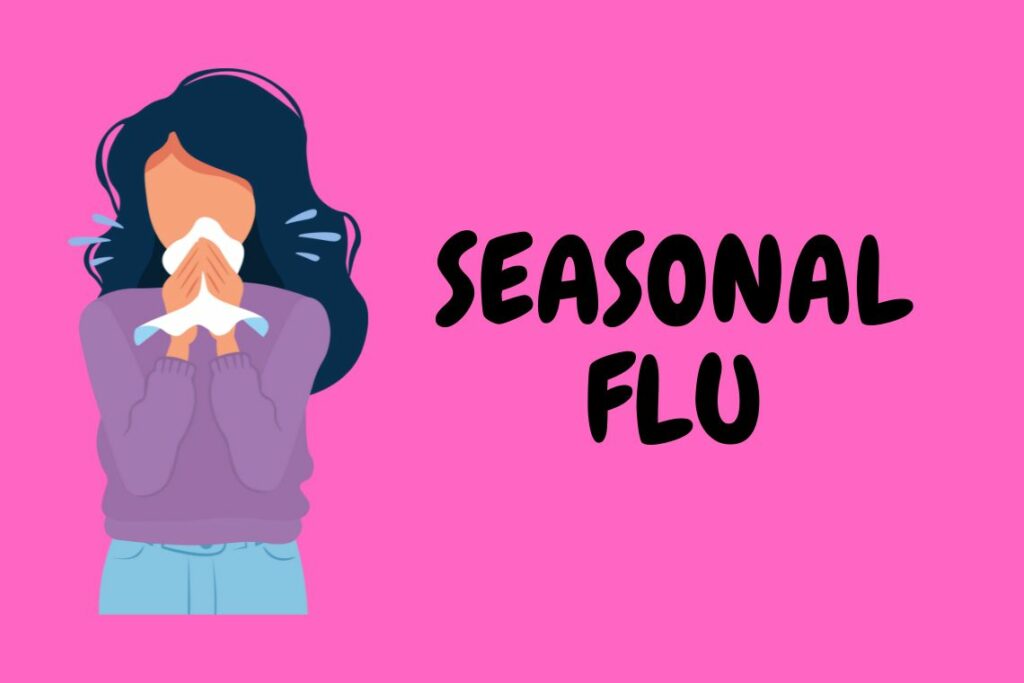Table of Contents

Seasonal Flu Symptoms and Treatment
Introduction:
As the seasons change, one unwelcome visitor that tends to make its annual appearance is the seasonal flu. Also known as influenza, this contagious respiratory illness affects millions of people worldwide each year. Understanding its symptoms and seeking appropriate treatment can help alleviate discomfort and prevent severe complications. In this article, we will delve into the common symptoms of seasonal flu and explore the available treatment options.
Symptoms of Seasonal Flu:
The seasonal flu shares some similarities with the common cold, but it tends to be more severe and can lead to complications.
Here are the typical symptoms associated with the flu:
- Fever: A sudden high fever is often one of the first signs of the flu. It can range from 100°F to 104°F (37.8°C to 40°C) or even higher.
- Body aches and fatigue: Flu symptoms are often accompanied by muscle and body aches, making you feel weak and fatigued.
- Cough and sore throat: A dry or productive cough and a sore throat are common symptoms of the flu.
- Headache: Many flu sufferers experience headaches that can range from mild to severe.
- Nasal congestion: While the flu primarily affects the respiratory system, it can cause nasal congestion and a runny or stuffy nose.
- Chills and sweats: Experiencing sudden chills and excessive sweating are common flu symptoms.
- Gastrointestinal symptoms: Some individuals may experience gastrointestinal symptoms such as nausea, vomiting, and diarrhea, although these are more common in children.
It is important to note that not everyone will experience all of these symptoms, and their severity may vary from person to person.
Treatment Options:
When it comes to treating seasonal flu, the primary goals are to relieve symptoms, prevent complications, and aid in a speedy recovery. Here are some commonly recommended treatment options:
- Rest and Fluids: Getting plenty of rest is crucial for allowing your body to recover. Drink fluids like water, herbal tea, and clear broths to stay hydrated and help relieve congestion.
- Over-the-counter Medications: Non-prescription pain relievers and fever reducers such as acetaminophen or ibuprofen can help alleviate fever, body aches, and headaches. However, always follow the recommended dosage instructions and consult a healthcare professional, especially if you have underlying health conditions or are taking other medications.
- Antiviral Medications: In some cases, your healthcare provider may prescribe antiviral medications to reduce the severity and duration of flu symptoms. These medications are most effective when taken within the first 48 hours of symptom onset.
- Symptomatic Relief: Over-the-counter cough syrups, throat lozenges, and nasal decongestants can provide temporary relief for respiratory symptoms. However, be cautious with the use of nasal decongestants, as they can cause rebound congestion if used for an extended period.
- Prevention through Vaccination: The most effective way to prevent seasonal flu is through annual flu vaccination. Vaccines are developed each year to target the most prevalent strains of the virus and help protect against infection or reduce its severity if contracted.
When to Seek Medical Attention:
While most cases of seasonal flu resolve on their own with self-care measures, certain circumstances warrant medical attention:
- Difficulty breathing or shortness of breath
- Chest pain or pressure
- Severe or persistent vomiting
- Confusion or altered mental state
- Worsening of symptoms after initial improvement
If you or a loved one experiences any of these symptoms, it is important to seek medical attention promptly.
Conclusion:
Seasonal flu can cause significant discomfort and potentially lead to complications, especially in vulnerable individuals. Understanding the symptoms and seeking appropriate treatment can help alleviate symptoms, prevent complications, and promote a faster recovery. By practicing good hygiene, getting vaccinated, and taking necessary precautions, we can reduce the impact of seasonal flu and safeguard our well-being during flu season.







Your blog has a universal appeal that makes it accessible to all readers.